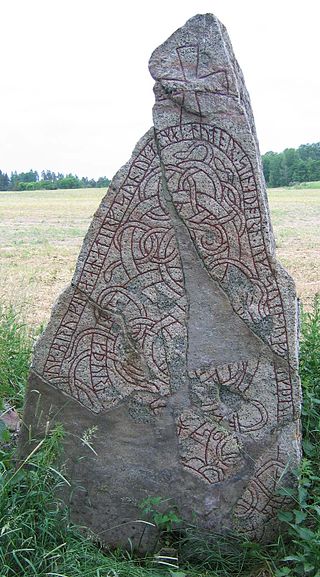Top Qs
Timeline
Chat
Perspective
Norsta Runestone
From Wikipedia, the free encyclopedia
Remove ads
The Norsta runestone is an 11th-century runestone inscribed in Old Norse with the Younger Futhark that stands near Wik Castle outside Uppsala, Sweden. It is notable because of the mention of two people named "maiden" and Sweyn. The form møy which appears on this runestone is the accusative form of Old East Norse māʀ which meant "maiden" and this is the only attestation of this word as the name of a girl, in Old Norse, besides a mention in the Hervarar saga, where a Mær ("maiden" in Old West Norse) married the Swedish king Inge I. Her brother was Blot-Sweyn, who succeeded Inge. As the runestone is from about the same time as Blot-Sweyn, it is likely that the Sweyn mentioned in the runestone is the same as the Swedish king Blot-Sweyn.
Remove ads
Inscription
sihikþurn
Sigþorn
'
...
...
[risa
ræisa
*
stin]
stæin
'
uk
ok
'
bru
bro
'
kera
gærva
:
at
at
:
aterf
Adiarf,
:
sun
sun,
:
uk
ok
'
a(t)
at
'
mai
Møy,
:
tutor
dottur
:
sin
sina,
:
eþorn
Æiþorn
:
uk
ok
:
suen
Svæinn
:
uk
ok
'
(u)ikþu-...
Vigþo[rn]
'
sikb--...
...
...(ʀ)
...
'
isi
<isi>
Sigþorn ... the stone raised and the bridge made in memory of Ádjarfr, (his) son, and in memory of Mey, his daughter; Eiþorn and Sveinn and Vígþorn ..
Remove ads
See also
Notes
Sources
Wikiwand - on
Seamless Wikipedia browsing. On steroids.
Remove ads


